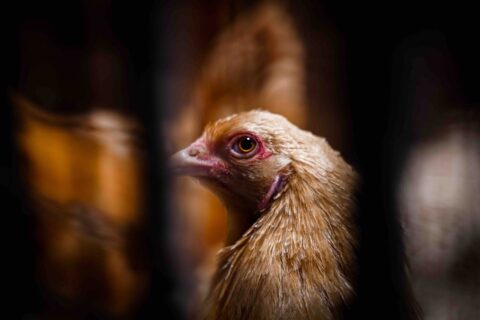News
GLP-1 Users Lose Weight, and Their Taste for Meat
Research•3 min read
Explainer
Human sentience is widely understood and accepted, while the sentience of other species, including farmed animals, is increasingly recognized.


Words by Jane Kotzmann
While there is nothing new about the word sentience, its public use seems to be increasing. Animal advocates argue that animals should have rights because they are sentient. Documentaries like Dominion and Earthlings highlight the sentience of animals by showing graphic video footage of animals appearing to experience pain and suffering. Mainstream reporting of scientific studies references sentience. Even recently enacted legislation in many parts of the world acknowledges that animals are sentient. While many people have some understanding of what is meant by sentience, its centrality to contemporary discussions about how humans treat animals warrants in-depth understanding.
“Sentient” is an adjective that describes a capacity for feeling. The word sentient derives from the Latin verb sentire, which means “to feel.” The first letters, “sen,” match the beginnings of common English words including sentiment, sensory, and sensation—all of which give hints as to the meaning of the term. In dictionary definitions, sentience is defined as “able to experience feelings,” “responsive to or conscious of sense impressions,” and “capable of feeling things through physical senses.” Sentient beings experience wanted emotions like happiness, joy, and gratitude, and unwanted emotions in the form of pain, suffering, and grief.
Sentience is a subject of rich scientific literature. While sentience has no generally accepted definition, scholars agree on some common elements. Dr. James Kirkwood, veterinarian and former director of the Universities Federation for Animal Welfare, and David DeGrazia, Elton Professor of Philosophy at George Washington University, consider sentience as the capacity to have feelings. Donald M. Broom, Emeritus Professor of Animal Welfare at Cambridge University, expands on Kirkwood and DeGrazia’s definition by detailing the abilities that a being must have to be considered sentient. According to Broom, a sentient being is able to “evaluate the actions of others in relation to itself and third parties, to remember some of its own actions and their consequences, to assess risks and benefits, to have some feelings, and to have some degree of awareness.”
The sentience of humans is widely understood and accepted, while the sentience of other animal species is increasingly being recognized. Early philosophers thought only of humans as sentient. Rene Descartes is famous for propounding the view that animals are automata—incapable of feeling pain or suffering. Even modern scientists have difficulty establishing with certainty which animals are sentient because humans cannot know definitively how another being (animal or human) is feeling. The agreed circle of sentience has expanded to include vertebrate animals (creatures with spines), and in particular parrots, dogs, pigs, cows, other farmed animals, and other companion animals. Studies of non-vertebrate animals, including octopus, squid, and cuttlefish, and decapod crustaceans (e.g. shrimp, lobsters, crayfish, and crabs), indicate that they too are probably sentient. Scientists have not yet conclusively determined whether spiders, other insects, and gastropods (e.g. slugs and snails) are sentient.
The concept of sentience is important because it provides a foundation for the animal welfare movement. Agreeing on the premise that sentient beings are capable of experiencing pain and suffering, most humans would further agree that it is morally wrong to inflict unnecessary pain or suffering. It may be persuasively argued that humans should not restrict our scope of protection to only sentient beings, because non-sentient things—trees and rivers, for example—also have intrinsic value. The primary importance of sentience as a moral measuring stick, however, is based on the idea that most people would agree that beings who can suffer should not be made to suffer unnecessarily.
Because of this prevailing ethic, most countries in the world have animal protection laws in place. Such legislation implicitly, if not explicitly, recognises that animals are sentient. To properly protect sentient animals, the existing laws worldwide are largely inadequate; much of the recent work by animal advocates highlights the current laws’ many shortcomings. Laws purportedly designed to protect animals from suffering commonly exclude clearly sentient creatures, such as farmed animals, from their scopes; purposefully use ambiguous language; and prioritise human interests, particularly economic ones, over animals’ needs to avoid pain and suffering.
Many animals are sentient—they experience feelings such as happiness, joy, pain, and suffering. This common-sense view is increasingly supported by science and provides a powerful tool through which humans can advocate for animals. It’ll be on our collective conscience if we don’t.